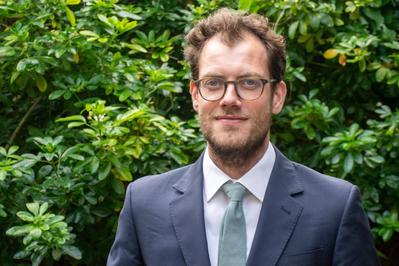Andrew Carter

Tell us about your background and why you decided to become a barrister.
I became a barrister because I am competitive, love performing, and I find it endlessly rewarding that you can change people’s lives for the better by the power of argument.
Did you face any obstacles along your journey to becoming a barrister and how did you overcome them? Have any of them persisted since becoming a barrister?
I had a very difficult family life growing up and studying law. My mother suffered from severe bipolar disorder and my father was an alcoholic. Because of my mother’s illness, she never held down any stable employment. We lived in real poverty, moving around from place to place, eventually ending up in (very) rural Victoria, Australia. My mother’s second husband was also an alcoholic with untreated mental health issues who was domestically abusive to my mother, my half-sister and me.
When I was 15, my mother decided that sadly she could no longer protect me after a particularly bad instance of domestic abuse, and I went to live with my grandparents in Melbourne.
I finished high school at the local state school and got into law at Monash University.
I had my own battles with mental ill health throughout university and into my early career, but I got a job as a lawyer, moved to the UK and worked for HMRC as a solicitor for about five years. I was called in 2018 and in 2020 joined the self-employed bar at 42 Bedford Row.
What opportunities, support and encouragement did you receive along your journey to becoming a barrister?
I had a great experience working at a legal aid agency in rural Victoria near the town where I lived as a teenager. I had a particularly great mentors: my managing lawyer and another lawyer in the town. I largely spurned relying on people and mentors because I wanted to avoid the appearance that I wanted sympathy or to feel I had jumped the queue somehow. But in hindsight, that was a mistake. I should have sought more support.
What is the most rewarding thing about being a barrister; has life at the Bar met your expectations?
I have a very diverse practice across family, property, personal injury and employment law. I find each area gives me something different. Getting parents to a point where they’re able to resolve their disputes together is particularly rewarding, as is securing important improvements in the lives of the children in front of a judge. Black-letter law is rewarding for a whole different set of reasons, and I find it equally exhilarating – the complexity and fear of error is everything that I wanted the Bar to be.
How do you use your experience of coming to the Bar from an under-represented background to support those seeking to do the same, and/or why is it important for barristers to contribute in this way?
I think my experience gives me an ability to empathise. I remember how it feels to walk in those shoes. I know what this client needs to know and what support they need to make empowered decisions about their futures.
How do you think the challenges around social mobility at the Bar which face aspiring barristers today could be addressed?
Diversity should be advocated for to encourage all the stakeholders to value it – Bench, solicitors, chambers, lay clients. Encouraging aspiring barristers to reach out and dispel the impostor syndrome is critical for attracting and retaining a diverse Bar.
What advice would you give to someone from an under-represented background, seeking to succeed at the Bar?
Do the work you know is going to be valuable once you get to the Bar. Read the cases. Read widely. Focus on your advocacy and strive for excellence wherever you are. If you make it to the Bar, fantastic and congratulations. If not, you’re a well-read, interesting advocate in whatever you end up doing – which is a reward in itself.
Andrew Carter is a barrister at 42 Bedford Row